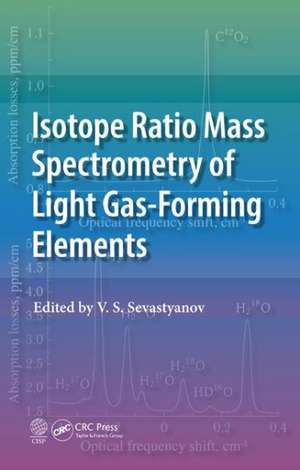Isotope Ratio Mass Spectrometry of Light Gas-Forming Elements
Editat de V.S. Sevastyanoven Limba Engleză Hardback – 25 iul 2014
- Presents a universal, economical, simple, and rapid technique for sample preparation of organic substances to measure the isotopic composition of carbon
- Describes how to determine microbial mineralization of organic matter in soil and the effect of exogenous substrates on environmental sustainability
- Examines use of the isotopic composition of n-alkanes from continental vegetation to study the paleoclimate and plant physiology
- Proposes a systematic approach to identifying tobacco areas of origin and tobacco products based on data from the isotopic composition of light elements
- Discusses ways to detect doping drugs and suggests results assessment criteria based on determining reference intervals for endogenous markers
- Reviews methods of release of gases from inclusions of rocks and minerals for further implementation of isotope mass spectrometric analysis
- Considers use of optical isotope analyzers for determining the isotopic composition of carbon in CO2 and of hydrogen and oxygen in water
Preț: 1042.58 lei
Preț vechi: 1441.90 lei
-28% Nou
Puncte Express: 1564
Preț estimativ în valută:
199.49€ • 208.85$ • 165.07£
199.49€ • 208.85$ • 165.07£
Comandă specială
Livrare economică 15-29 martie
Doresc să fiu notificat când acest titlu va fi disponibil:
Se trimite...
Preluare comenzi: 021 569.72.76
Specificații
ISBN-13: 9781466594074
ISBN-10: 1466594071
Pagini: 244
Ilustrații: 99 black & white illustrations, 71 black & white tables
Dimensiuni: 156 x 234 x 20 mm
Greutate: 0.45 kg
Ediția:1
Editura: CRC Press
Colecția CRC Press
ISBN-10: 1466594071
Pagini: 244
Ilustrații: 99 black & white illustrations, 71 black & white tables
Dimensiuni: 156 x 234 x 20 mm
Greutate: 0.45 kg
Ediția:1
Editura: CRC Press
Colecția CRC Press
Public țintă
Students of geology and analytical chemistry, geochemistry scientists, ecologists, pharmaceutical experts, biologists, ecologists, atmospheric and oceanic scientists, and biochemists.Cuprins
Isotope Ratio Mass Spectrometry: Devices, Methods, and Applications. Universal Method for Preparation of Liquid, Solid, and Gaseous Samples for Determining the Isotopic Composition of Carbon. Using Isotope Ratio Mass Spectrometry for Assessing the Metabolic Potential of Soil Microbiota. Study of the Isotopic Composition of Normal Alkanes of Continental Plants. Using Isotope Ratio Mass Spectroscopy for Analysis of Tobacco. Using Isotope Mass Ratio Spectrometry of Carbon in Doping Control. Isolation Methods in Isotope Geochemistry of Noble Gases. Using Laser Spectroscopy for Measuring the Ratios of Stable Isotopes.
Notă biografică
V.S. Sevastyanov is vice head of the Department of Carbon Geochemistry at his Ph.D and big doctorate alma mater, the Vernadsky Institute of Geochemistry and Analytical Chemistry, Russian Academy of Science, Moscow. He also holds two masters degrees—one from Lomonosov Moscow State University and one from the Moscow Engineering Physics Institute. A widely published member of the Russian Mass Spectrometry Society and the ESIR, he has served as a senior scientist at several prestigious Russian laboratories. His current research interests include isotope ratio mass spectrometry, stable isotopic geochemistry and archeology, organic geochemistry, isotopic analysis of oil and gases, forensic science, and food analysis.
Descriere
Providing a complete picture of the latest advancements in the field, this book explores different methods of isotope analysis, including spark, secondary ion, laser, glow discharge, and isotope ratio mass spectrometry. It explains how to determine the isotopic composition of light elements in solid, liquid, and gaseous samples of organic and inorganic substances, aiding readers from a variety of disciplines in identifying the fundamental processes in biological, ecological, and geological systems and in revealing the subtle features of many physicochemical processes and chemical transformations.
